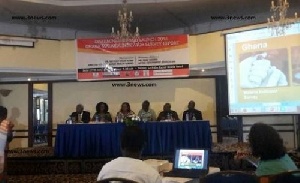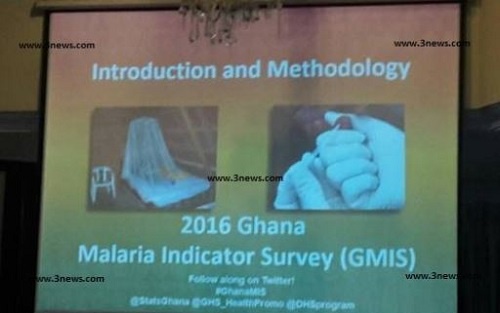 hree thousand and eighty children were tested for anaemia and malaria
hree thousand and eighty children were tested for anaemia and malaria
The 2016 Ghana Malaria Indicator Survey report has been launched in Accra. The report shows Ghana is making progress in the fight against Malaria.
However, a lot more needs to be done to achieve targets. The report is the first stand-alone Malaria Indicator Survey conducted in Ghana on the Ghana demographic and health survey programme.
The report shows prevention practices is on the rise in the country, thus ownership of long-lasting insecticides-treated mosquito nets (LLIN) has doubled in the last eight years.
Therefore, more than 7 in 10 households now own LLIN compared to 31 per cent in 2008 and 64 per cent in 2014. The report revealed that among high-risk groups, half of pregnant women and 52 per cent of children Under Five cited used an LLIN the night before the survey.
This, it indicated, represents an increase from 39 per cent of pregnant women and 34 per cent children Under Five in 2014. Indicators of the survey included Malaria prevention, use of treated and untreated mosquito nets, prevalence of malaria among children 6 to 9 months, among others.
The finding of the report indicated that the National Malaria prevalence among children 6 months to 59 months has decreased from 27 per cent to 21 per cent between the 2014 Ghana Demographic and Health Survey and the 2016 Ghana Malaria Indicator Survey.

Again, Malaria prevalence among children varied throughout the administrative regions of Ghana: thus 5 per cent in Greater Accra, 30 per cent in Central Region and 31 per cent in the Eastern Region. This means children in the rural areas are more likely to be infected with malaria than urban children. Acting
Government Statistician Baah Wadieh indicated the report shows malaria prevention practices are on the rise. He urged participants to study the report carefully and use the information to guide planning and intervention programmes associated with malaria.
“This is a call to action and it is our expectation that the result of the 2016 Ghana MIS will be utilized by government and the MOH/GHS to inform policies, priorities and programmes.”
Deputy Director General of the Ghana Health Service Dr. Gloria Kwansah Asare indicated that the GMIS has come at an opportune time for the Ghana Health Service because the Service needed accurate and current data for their global fund malaria grant.
“The findings of this survey will be helpful in appreciating the progress or otherwise made in the fight against malaria.”
Acting Programme Manager of the National Malaria Control Programme Dr. Kezia Malm, who welcomed the key findings, urged stakeholders not to relent in their effort to end malaria for good.
“The enthusiasm and momentum exist for moving towards elimination. However, we in Ghana believe that such ambitious effort needs to be sustained for the duration of the control efforts require a substantial research.”
Representative from UNAIDS encouraged the country to use the report to make progress towards edging malaria for good.
The survey covered about 6,000 households. Over 5,000 women between the ages of 15 to 49 were interviewed. Three thousand and eighty children were tested for anaemia and malaria.